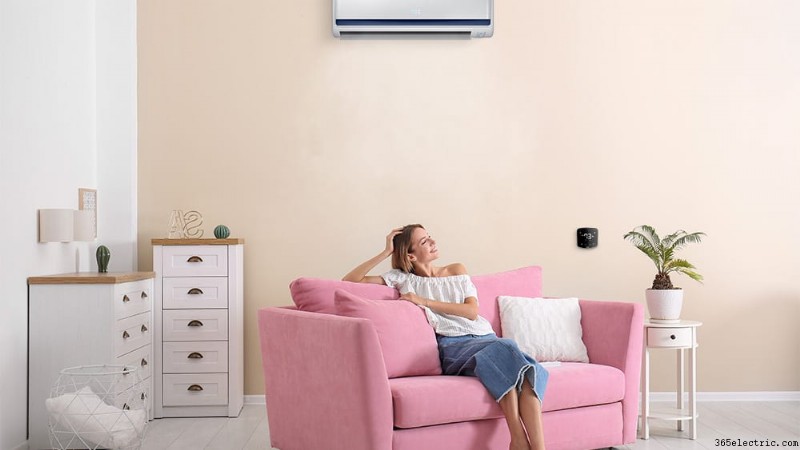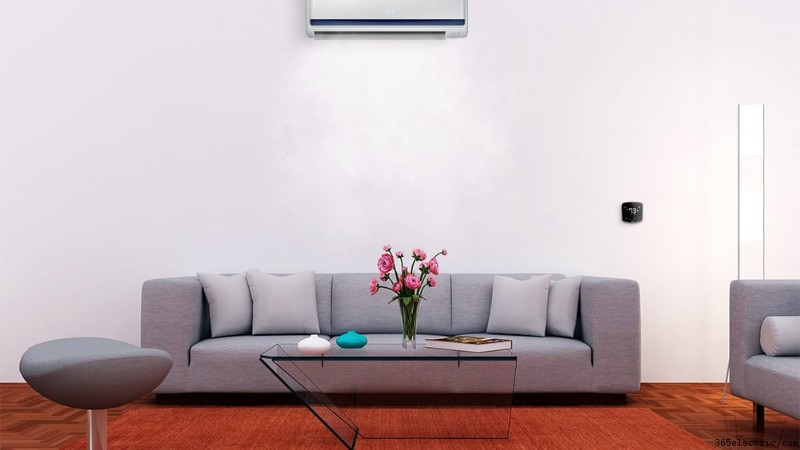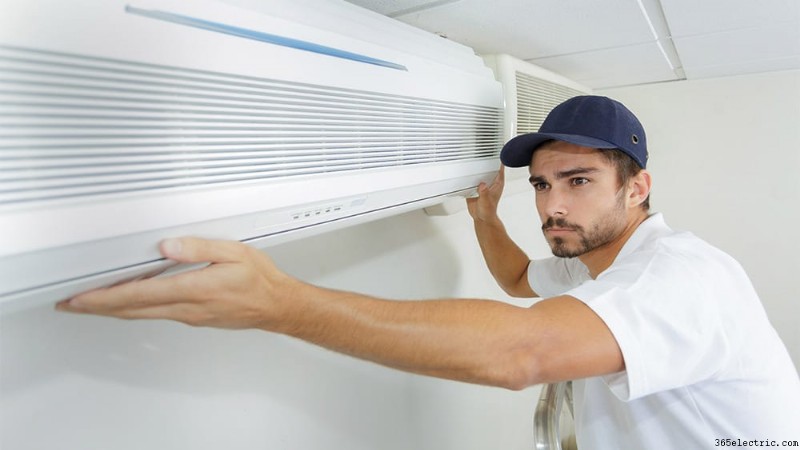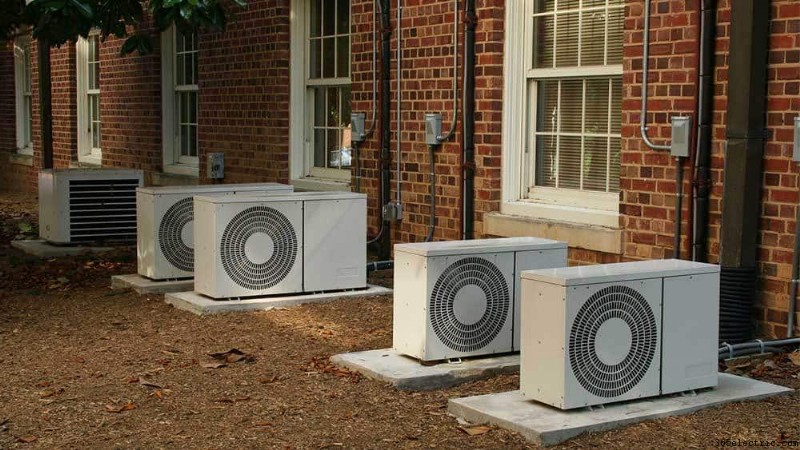Najboljši vodnik za nakup klimatske naprave v letu 2022

Zaradi vročine poleti in nizkih temperatur pozimi so klimatske naprave postale stalnica v večini domov. Posledično približno 87 % domov v ZDA uporablja klimatsko napravo.
Recimo, da vas zanima nadgradnja obstoječe enote ali razmišljate o namestitvi dodatne klimatske naprave v vašem domu; zelo priporočljivo je, da naredite domačo nalogo, preden sprejmete končno odločitev.
Nakup klimatske naprave je lahko velik strošek, zato si morate zastaviti nekaj kritičnih vprašanj, da zagotovite, da boste izbrali najboljšo razpoložljivo možnost. Kateri tip AC enote je najbolj primeren za velikost vaše sobe? Potrebujete pametno ogrevanje in hlajenje? Kdaj je najboljši čas za nakup klimatske naprave? Kako izbrati izvajalca HVAC?
Na vsa ta vprašanja boste našli odgovore v tem vodniku za nakup klimatske naprave, ki vam bo pomagal sprejeti najboljšo možno odločitev.
17 stvari, ki jih morate upoštevati pri nakupu klimatske naprave
Obstaja več stvari, vključno z velikostjo, lokacijo, učinkovitostjo in drugimi, ki jih morate upoštevati, preden se odločite za nakup klimatske naprave. Poglobimo se in si oglejmo vse pomembne stvari, ki jih morate vedeti, ko kupujete najboljšo klimatsko napravo za svojo sobo.
1. Vrsta klimatske naprave
Obstaja več vrst klimatskih naprav – izbira prave, ki bo ustrezala vsem vašim potrebam, je izjemnega pomena. Naslednje vrste sobnih klimatskih naprav bi bile najbolj primerne kot dodatek k posameznemu prostoru.
Okenske klimatske naprave
To so najpogostejše vrste klimatskih naprav. Če imate majhen prostor z ustreznim oknom, se odločite za okenske klimatske naprave. So različnih velikosti in so primerne za manjše prostore. So cenejši, enostavni za vzdrževanje in namestitev. Odločite se za okensko toplotno črpalko za celoletno rešitev ogrevanja in hlajenja.
Prenosne klimatske naprave
So prostostoječi talni sistemi s kolesi; jih lahko preprosto premikate. Poleg hlajenja prostora tudi odvajajo vroč zrak skozi lijak. Iz tega razloga je treba večino prenosnih klimatskih naprav ali toplotnih črpalk postaviti blizu okna, da se vroč zrak sprosti ven.
So dobra možnost za eno sobo, niso pa primerne za večje sobe ali več sob.
Ducless Mini-Splits
Če želite eno ali dve sobi ohladiti z energijsko učinkovitim sistemom, je mini split brez kanalov za vas. Namestijo se na steno in jih zato imenujemo tudi stenske klimatske naprave. Mini-split paket je sestavljen iz ločene notranje in zunanje enote, ki ju enostavno povežete skozi majhno odprtino v vaši steni.
Na voljo je več možnosti, vključno s stenskimi, talno nameščenimi, enoconskimi in večconskimi mini split enotami.
2. Kakšna je prava velikost klimatske naprave za vaš dom?
Enota HVAC, ki je prevelika za vaš prostor, se bo ohladila/ogrela v nekaj minutah, vendar ne bo mogla odstraniti odvečne vlage iz zraka.
Manjša enota bo težko opravljala svoje delo, kar dolgoročno vpliva na njeno delovanje.
Poskrbeti morate, da kupite enoto, ki je popolne velikosti za vašo sobo, saj ne zagotavlja le udobja, ampak vam tudi prihrani denar. Z izbiro prave velikosti se lahko izognete nepotrebnim popravilom in visokim računom za elektriko.
Na velikost vaše klimatske naprave vpliva veliko dejavnikov, vključno z ravnjo vlažnosti, velikostjo prostora, lokacijo vaše sobe, izolacijo sten, vrstami in številom oken ter številom ljudi v sobi. Zato poskrbite, da boste upoštevali vse dejavnike, da se izognete kasnejšim težavam.
3. Kakšen je vaš proračun?
When considering buying a new AC, you should set aside a budget. When making a budget, don’t only consider the initial cost but also the cost for installation, operation, and maintenance.
- If you need a larger-sized unit for a large room, it will cost more but will efficiently cool your space.
- An air conditioner with more features will have a higher price. If you opt for a smart air conditioner, the initial price will be higher, but it will pay off with savings and added comfort. Similarly, Energy-Star certified ACs will be costly but will result in more savings on your energy bills.
- Write down both the costs and benefits of your choice of AC unit. If the benefits are not worth the money, consider investing in a better AC model.
- Portable and window air conditioners are considerably cheaper than other options, but their cooling power may also be lower. Though, the wall ACs will have a higher installation cost than window-mounted. Mini-splits are cost-effective if you have to heat or cool larger rooms.
- While portable and window ACs hardly have any installation costs, some mini-split variations can be expensive to install. You can also look into DIY AC models to eliminate AC installation costs.
4. Smart Heating/Cooling

Constantly having to change the temperature can be quite annoying and also mess up your bills. Why don’t you consider investing in smart technology to solve these issues?
You can invest in a smart air conditioner that provides automation, or you can buy a regular AC and make it smart using a separate smart device. Just keep in mind that smart devices offer additional features that you may not get with all smart ACs.
A smart thermostat or a smart AC controller that works with a mini-split air conditioner, window AC and portable heat pump can make your life a lot easier. They go beyond the temperature and humidity regulation. If you forget to turn off AC, no worries, geofencing mode will take care of it. You can also control your AC remotely using your phone.
Moreover, you get notifications about system maintenance like air filter status and even reports about your energy usage.
5. The Location of Your Home
Is your home constantly under the gaze of the hot sun, or do you live in an area surrounded by trees that give a cooling effect? Do you live in a dry environment or a coastal area with high humidity?
Depending on the climate of your area, you might need additional AC features; dry mode, for instance, will be required if you live in a humid area, or Freeze Protection Mode for your vacation rental located in an extreme climate area can be very beneficial.
6. The Structure of Your Room
Do you wish to place an air conditioner in an attic that has slanted walls? Is your window centered on the wall? The structure of your room indicates where a room air conditioner will be placed and what type of AC will be best suited for the place.
Wall-mounted mini-splits go high up on a straight wall, while floor-mounted mini-splits are preferred if you have slanted walls. Window air conditioners, of course, require a suitable window and may not fit in casement or irregular-sized windows. You must measure the height and width of your window to select an AC that will fit. Portable air conditioners are best if other options are unsuitable for your space. While they are easily portable and can fit almost anywhere, their cooling capacity may also be limited.
7. Best Time to Buy an Air Conditioner
Buying an air conditioner during the peak season is never a good idea. When the weather starts to get warmer, the air conditioner sales boom; similarly, when the temperature falls, prices for reversible heat pumps also get high due to an increase in demand.
It’s always recommended to buy an air conditioner during the off-season months that fall in spring and autumn. In spring, it is cool, and many people would not think of turning on the air conditioner. During autumn months, it is not cold enough that people would require heat pumps full time. So, a drop in demand will help you strike a good deal during these two seasons.
8. EER/SEER Rating System
These are rating systems that determine the efficiency of an HVAC unit. The efficiency of your air conditioner is directly related to the electricity cost and the level of comfort.
There are two types of energy efficiency ratings:EER and SEER.
EER is the energy efficiency ratio of cooling energy to the amount of electricity required to power the unit. SEER, on the other hand, is Seasonal Energy Efficiency Ratio. It is also the ratio of cooling power to electricity input energy, but the difference is that it only considers the seasonal usage rather than year-round usage. According to Federal law, the new models should have a SEER of at least 13.
It is essential to take into account these ratings because air conditioning units with higher EER and SEER ratios consume less power, provide better cooling, and are more eco-friendly. These may be more costly initially but result in greater energy-savings.
9. Installation of Your Air Conditioner

Improper installation can cost you a 30% increase in electric bills. Your air conditioning unit needs to be well-fitted for proper functioning.
In the case of window air conditioners, make sure the unit is leveled not to face any drainage issues. Cover any gaps and crevices around your unit as air leakage can affect energy consumption.
In the case of mini-splits, when installing the indoor unit, keep in mind that airflow can get restricted by things like furniture. The outdoor unit should be placed in an area that does not get harsh sunlight and make sure it is properly covered for protection against rain, sun, and heavy winds.
Each type of air conditioner has a specific installation requirement that should never be ignored. You can consult an HVAC expert to get a better idea of your AC requirements.
Make sure you hire an expert trained in installing air conditioners to avoid any major problems afterward.
10. AC Modes/Features
Some air conditioner modes such as vane control, temperature change, fan speed, and other basic modes are a part of every air conditioning unit. However, there are certain special AC modes that you can consider looking for, depending on your needs:
- Heat Mode:Some air conditioners can also provide heat. Opt for a reversible air conditioner or heat pump if you require your unit to cool in the summer and heat during winter.
- Dry Mode:If you live in a humid environment, you should consider buying an air conditioner that comes with this mode. Dry mode removes the excess moisture, reducing the clammy feeling in summers.
- Freeze Protection Mode (FP):In this mode, your AC will run on heat mode to blow warm air into a room. This feature is helpful for homes in extremely cold climates. FP prevents pipes from freezing and bursting. If you go on vacations during winters, consider investing in an AC that supports this mode.
- Energy Saving Mode (Eco Mode):It is a feature that helps you save on bills without compromising on your comfort. This feature causes the fan to cycle on and off with the compressor instead of continuously running. This mode reduces the power your air conditioner consumes.
- Self-Clean Mode:This mode prevents the growth of harmful germs by removing moisture inside your unit. By using this mode, you ensure that the air you breathe in is free from pollutants.
- Follow Me Mode:If you hate waiting for an air conditioner to cool/heat the entire room to feel comfortable, this mode is the one you should be looking for. The follow-me AC mode directs the airflow towards you, making you feel comfortable in no time. In some ACs, it allows your remote to act as a thermostat.
11. An Energy-Efficient Inverter Technology
For better cooling/heating and higher efficiency, inverter technology is worth looking for when buying an HVAC unit.
In inverter technology, the compressor does not turn on/off frequently; it just changes the speed to meet the heating/cooling needs. It is a little pricey but consumes 50% less energy than non-inverter air conditioners. This can drastically reduce your electricity costs, saving you money in the long run.
12. Condenser Coils

With much of your focus on your air conditioner’s indoor unit, you are likely to forget that the condenser part or outdoor unit is equally important.
There are two types of condensers coils:
· Aluminum condenser coils
· Copper coils
Aluminum coils do not require high maintenance, but their repair is complicated compared to copper coils if they are damaged or broken. It is best to go for copper condensers to ensure high functionality.
13. Pay Attention to Noise
Paying attention to the AC noise is crucial as it can affect your comfort level. Ideally, the noise range should be under 50 decibels. High AC noises can ruin your sleep and comfortable daytime environment.
14. Selecting an HVAC Contractor
For choosing an HVAC contractor, you have to do some research. Google the local contractors in your area, read reviews, and check those with a good track record. Be wary of contractors whose websites are loaded with 5-star ratings; fake reviews are a real thing.
The job is not done after you have found a contractor. There are a bunch of things that need to be checked before you proceed to buy an air conditioner:
- Always check if the contractor is licensed or not. They should be licensed by the Contractors State License Board. Many claim to be, but actually, they are not, so don’t forget to cross-check.
- If the contractor tries to give you an estimate over the phone, don’t hire that contractor. A professional contractor would never do that; they would always survey your house first.
- Always take the bid in a written form. A verbal bid is a red flag and should be avoided.
15. Your Home Insulation
While home insulation does not directly affect the type of AC you buy, it does influence your cooling! Before purchasing an AC unit, you should check whether your home is properly insulated or not. Gaps under the doors and windows can cause the infiltration of cold/hot air into your home. In this scenario, your AC will have to work harder, which can negatively impact your bills.
It would be best to insulate your doors, windows, ceilings, and floors to keep heat from moving in during the summer and keep heat from moving out during the winter.
The more insulation you provide, the better your air conditioner will function.
16. Regular Maintenance
When buying a new air conditioner, you must commit to its regular maintenance. It will ensure the optimum functionality of your AC and will also help in extending its lifespan.
When selecting an air conditioner, you should speak to your contractor about the maintenance plan. Most professional home service companies have deals on yearly HVAC maintenance.
17. Check the Warranty
Air conditioner’s warranty varies from brand to brand. Always make sure to check the warranty period and what it covers. Some warranties cover most problems of the AC unit, while others only cover specific parts. Some models even offer a lifetime warranty on the compressor – the most expensive part of your AC, so do take that into consideration.
Buying an air conditioner is a big decision as it impacts the overall temperature &the resulting comfort of your home. The best air conditioner for you depends on your budget, the size of your room, and the additional features you require as per your convenience. All the points discussed in this air conditioner buying guide can help you make an informed decision about buying air conditioners in 2021.
Once you know what kind of AC you need for your space, you’re ready to go shopping!
